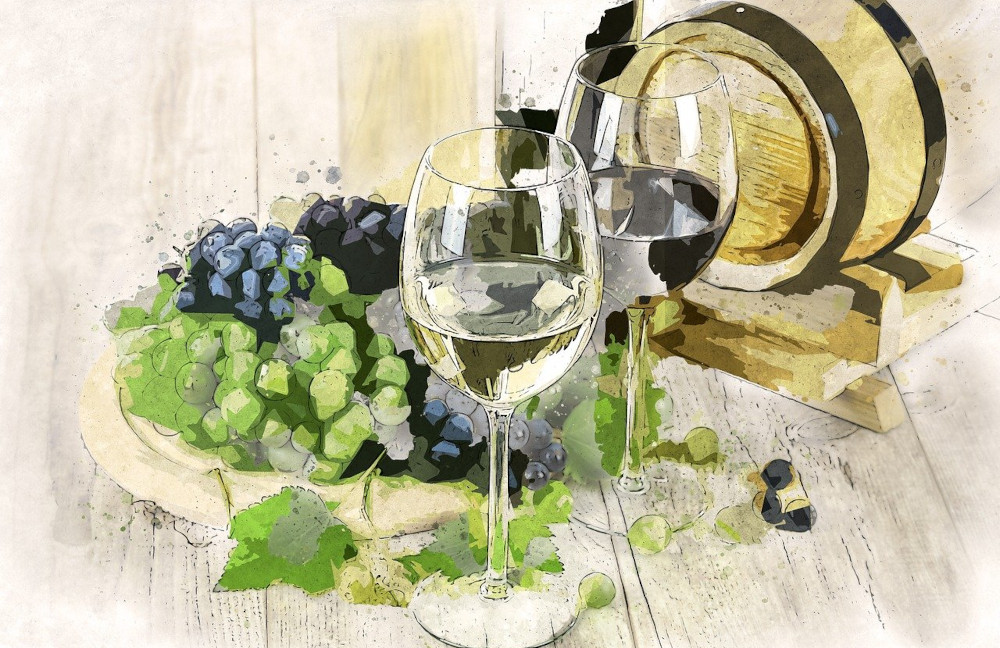Drink alcohol. Social drinking. What does the Bible say?
These phrases often come up when Christians discuss whether it is acceptable for believers to consume alcoholic beverages.
With various perspectives on the issue, it can be confusing to know what stance to take.
There are good reasons to thoughtfully consider your position on alcohol instead of simply rejecting or embracing its use.
This article will examine what the Bible says about alcohol use and look at broader principles that can guide Christians today.
Continue reading to gain a balanced, biblical perspective on this hotly debated topic.
Overview: Alcohol in the Bible and for Christians Today

The Bible refers to alcohol consumption but does so without giving definite commands to abstain or freely imbibe.
Drunkenness is consistently condemned, but moderate drinking is not.
Biblical figures like Jesus and the apostles drank wine, and certain Bible passages portray it as a gift from God.
However, other verses warn against overindulgence and drunkenness.
The principles of Christian freedom, wisdom, and witness come into play when evaluating personal alcohol use today.
There are good arguments on both sides of moderation versus abstinence.
Is It A Sin To Drink Alcohol According to the Bible?

The Bible condemns drunkenness but does not prohibit all alcohol use. Let’s look at some key passages:
Old Testament References
Several Old Testament verses portray wine as a blessing from God (Psalm 104:14-15; Ecclesiastes 9:7).
“14 He makes grass grow for the cattle, and plants for people to cultivate— bringing forth food from the earth: 15 wine that gladdens human hearts, oil to make their faces shine, and bread that sustains their hearts.”
Psalm 104:14-15 (NIV)
biblegateway.com
“Go, eat your food with gladness, and drink your wine with a joyful heart, for God has already approved what you do.”
Ecclesiastes 9:7 (NIV)
biblegateway.com
However, the Bible also warns against excessive drinking and drunkenness (Proverbs 20:1; Isaiah 5:11; Habakkuk 2:15-16).
“Wine is a mocker and beer a brawler; whoever is led astray by them is not wise.“
Proverbs 20:1 (NIV)
biblegateway.com
“Woe to those who rise early in the morning to run after their drinks, who stay up late at night till they are inflamed with wine.”
Isaiah 5:11 (NIV)
biblegateway.com
“15 Woe to him who gives drink to his neighbors, pouring it from the wineskin till they are drunk so that he can gaze on their naked bodies!
16 You will be filled with shame instead of glory. Now it is your turn! Drink and let your nakedness be exposed! The cup from the Lord’s right hand is coming around to you, and disgrace will cover your glory.”Habakkuk 2:15-16 (NIV)
biblegateway.com
The Bible advises kings and leaders not to drink, so their judgment is not impaired (Proverbs 31:4-5).
“4 It is not for kings, Lemuel—it is not for kings to drink wine, not for rulers to crave beer, 5 lest they drink and forget what has been decreed, and deprive all the oppressed of their rights.“
Proverbs 31:4-5
biblegateway.com
Jesus and Alcohol

Jesus’ first miracle was turning water into wine at a wedding feast (John 2:1-11).
“7 Jesus said to the servants, “Fill the jars with water”; so they filled them to the brim.
8 Then he told them, “Now draw some out and take it to the master of the banquet.”
They did so, 9 and the master of the banquet tasted the water that had been turned into wine. He did not realize where it had come from, though the servants who had drawn the water knew. Then he called the bridegroom aside 10 and said, “Everyone brings out the choice wine first and then the cheaper wine after the guests have had too much to drink; but you have saved the best till now.”
John 2:7-10 (NIV)
biblegateway.com
He compares the kingdom of heaven to new wine at a celebration (Luke 5:36-39).
“36 He told them this parable: “No one tears a piece out of a new garment to patch an old one. Otherwise, they will have torn the new garment, and the patch from the new will not match the old. 37 And no one pours new wine into old wineskins. Otherwise, the new wine will burst the skins; the wine will run out and the wineskins will be ruined. 38 No, new wine must be poured into new wineskins. 39 And no one after drinking old wine wants the new, for they say, ‘The old is better.’”
Luke 5:36-39 (NIV)
biblegateway.com
Jesus drank wine and was accused of being a drunkard, indicating He imbibed without sinning (Matthew 11:19).
“The Son of Man came eating and drinking, and they say, ‘Here is a glutton and a drunkard, a friend of tax collectors and sinners.’ But wisdom is proved right by her deeds.”
Matthew 11:19 (NIV)
biblegateway.com
New Testament Teachings

The New Testament also forbids drunkenness (Ephesians 5:18).
“Do not get drunk on wine, which leads to debauchery. Instead, be filled with the Spirit.”
Ephesians 5:18 (NIV)
biblegateway.com
Deacons and elders are instructed not to indulge in much wine (1 Timothy 3:8).
“In the same way, deacons are to be worthy of respect, sincere, not indulging in much wine, and not pursuing dishonest gain.”
1 Timothy 3:8 (NIV)
biblegateway.com
In 1 Timothy 5:23, Paul instructed Timothy to no longer drink water only but to use a little wine for his health.
“Stop drinking only water, and use a little wine because of your stomach and your frequent illnesses.”
1 Timothy 5:23 (NIV)
biblegateway.com
Overall, the New Testament portrays moderate wine drinking as acceptable but warns against excessive drinking.
Key Principles for Christians and Alcohol Today

Given the complex biblical evidence, additional principles can help guide Christians today regarding alcohol use:
Christian Freedom
The New Testament allows believers the freedom to eat and drink in moderation without passing judgment (Romans 14:1-23).
However, we’re cautioned to avoid causing others to stumble.
“13 Therefore let us stop passing judgment on one another. Instead, make up your mind not to put any stumbling block or obstacle in the way of a brother or sister. 14 I am convinced, being fully persuaded in the Lord Jesus, that nothing is unclean in itself. But if anyone regards something as unclean, then for that person it is unclean. 15 If your brother or sister is distressed because of what you eat, you are no longer acting in love. Do not by your eating destroy someone for whom Christ died.”
Romans 14:13-15 (NIV)
biblegateway.com
Wisdom
The Bible repeatedly warns against excessive drinking. Wisdom means recognizing our tendency to overindulge (Proverbs 20:1 NIV).
“Wine is a mocker and beer a brawler; whoever is led astray by them is not wise.”
biblegateway.com
Witness
If drinking alcohol harms your witness and influence for Christ, you should abstain (1 Corinthians 10:31-33).
However, for some cultures, moderate drinking may not hinder the Gospel’s impact.
“31 So whether you eat or drink or whatever you do, do it all for the glory of God. 32 Do not cause anyone to stumble, whether Jews, Greeks or the church of God— 33 even as I try to please everyone in every way. For I am not seeking my own good but the good of many, so that they may be saved.”
1 Corinthians 10:31-33 (NIV)
biblegateway.com
Conclusion and Key Takeaways
In summary, here are some key things to remember about alcohol and the Bible:
- The Bible prohibits drunkenness.
- Principles like Christian freedom, wisdom, and witness should guide alcohol use today.
- Christians have differing views on total abstinence versus moderation.
- Each believer must study Scripture, pray, and decide what is best for their faith and witness.
- If drinking alcohol, Christians must exercise restraint, wisdom, and moderation.
The Bible provides both principles and examples to guide Christians regarding alcohol consumption. As we seek God and His wisdom, believers can thoughtfully decide if they should drink or abstain.
The key is to maintain self-control and godly wisdom in either choice.
Frequently Asked Questions
Let’s look at some common questions about what the Bible says regarding alcohol use for Christians today:
Q. Is It a Sin to Drink Alcohol at All?
A. No, the Bible does not prohibit alcohol outright. Drunkenness is clearly sinful, but moderate drinking is not labeled as inherently sinful in Scripture.
Q. Did Jesus Drink Alcoholic Wine?
A. Yes, Jesus consumed alcoholic wine in moderation. The Greek word for “wine” in the New Testament refers to fermented grape juice with low alcohol content.
Q. Is Social Drinking Acceptable for Christians?
A. Social drinking in moderation is not prohibited in Scripture. However, Christians are called to exercise wisdom and refrain from drunkenness.
Each believer must decide if moderate social drinking is wise and beneficial for them.
Q. Are Christians Required to Abstain from Alcohol?
A. No biblical passage requires Christians to completely abstain from alcohol. Consuming alcohol in moderation with wisdom and restraint is permitted in Scripture.
However, some believers may feel abstinence is the best choice for them.
Q. Does the Bible Forbid Getting Drunk?
A. Yes, the Bible consistently condemns drunkenness as foolish and sinful. Christians are instructed not to impair their judgment or lose self-control through excessive alcohol. Moderation is key.
Q. What is meant by the abuse of alcohol?
A. Abuse of alcohol refers to excessive and harmful consumption that can lead to addiction and health problems.
Q. Did Jesus turn water into wine?
A. Yes, according to the Bible, Jesus performed a miracle by turning water into wine at a wedding feast (John 2:1-11).
Q. What does the Bible say about wine?
A. The Bible mentions wine in various contexts, including joyous occasions, celebrations, and medicinal purposes.
Q. What is the use of wine?
A. Wine is commonly consumed for its taste, as part of religious ceremonies, and for its potential health benefits.






